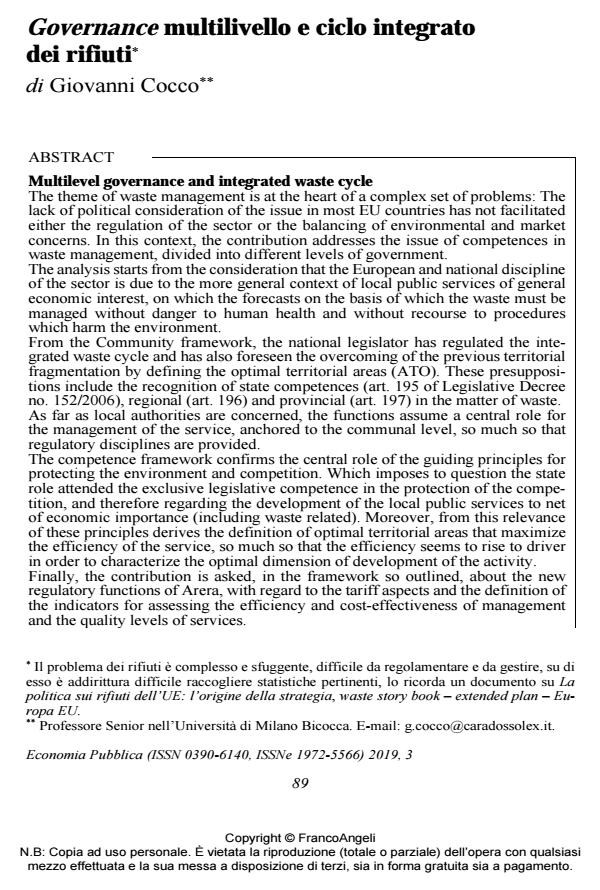Multilevel governance and integrated waste cycle
Journal title ECONOMIA PUBBLICA
Author/s Giovanni Cocco
Publishing Year 2020 Issue 2019/3
Language Italian Pages 23 P. 89-111 File size 100 KB
DOI 10.3280/EP2019-003004
DOI is like a bar code for intellectual property: to have more infomation
click here
Below, you can see the article first page
If you want to buy this article in PDF format, you can do it, following the instructions to buy download credits

FrancoAngeli is member of Publishers International Linking Association, Inc (PILA), a not-for-profit association which run the CrossRef service enabling links to and from online scholarly content.
The theme of waste management is at the heart of a complex set of problems: The lack of political consideration of the issue in most EU countries has not facilitated either the regulation of the sector or the balancing of environmental and market concerns. In this context, the contribution addresses the issue of competences in waste management, divided into different levels of government. The analysis starts from the consideration that the European and national discipline of the sector is due to the more general context of local public services of general economic interest, on which the forecasts on the basis of which the waste must be managed without danger to human health and without recourse to procedures which harm the environment. From the Community framework, the national legislator has regulated the integrated waste cycle and has also foreseen the overcoming of the previous territorial fragmentation by defining the optimal territorial areas (ATO). These presuppositions include the recognition of state competences (art. 195 of Legislative Decree no. 152/2006), regional (art. 196) and provincial (art. 197) in the matter of waste. As far as local authorities are concerned, the functions assume a central role for the management of the service, anchored to the communal level, so much so that regulatory disciplines are provided. The competence framework confirms the central role of the guiding principles for protecting the environment and competition. Which imposes to question the state role attended the exclusive legislative competence in the protection of the competition, and therefore regarding the development of the local public services to net of economic importance (including waste related). Moreover, from this relevance of these principles derives the definition of optimal territorial areas that maximize the efficiency of the service, so much so that the efficiency seems to rise to driver in order to characterize the optimal dimension of development of the activity. Finally, the contribution is asked, in the framework so outlined, about the new regulatory functions of Arera, with regard to the tariff aspects and the definition of the indicators for assessing the efficiency and cost-effectiveness of management and the quality levels of services.
Keywords: Tax, environment, waste collection, multi-level governance Parole chiave: tributo, ambiente, igiene urbana, multi-level governance
Jel codes: L51, Q57, K32
Giovanni Cocco, Governance multilivello e ciclo integrato dei rifiuti in "ECONOMIA PUBBLICA " 3/2019, pp 89-111, DOI: 10.3280/EP2019-003004